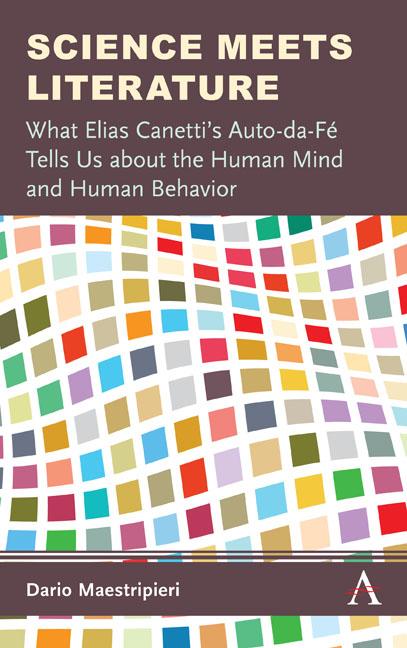 Science Meets Literature
Science Meets Literature Book contents
- Frontmatter
- Contents
- Preface
- Acknowledgments
- Chapter One Why Science and Literature?
- Chapter Two Elias Canetti: A Visionary Literary Genius on a Quest to Understand Human Nature
- Chapter Three The Plot of Auto-da-Fé
- Chapter Four Auto-da-Fé Is a Novel about Human Nature
- Chapter Five Major Themes Running Through Auto-da-Fé
- Chapter Six Analysis of Part I: A Head Without a World
- Chapter Seven Analysis of Part II: Headless World
- Chapter Eight Analysis of Part III: The World in the Head
- Chapter Nine Narrative Strategies in Auto-da-Fé
- Chapter Ten Consilience, the Canetti Way
- Elias Canetti: Chronology
- References
- Index
Chapter Seven - Analysis of Part II: Headless World
Published online by Cambridge University Press: 06 July 2019
- Frontmatter
- Contents
- Preface
- Acknowledgments
- Chapter One Why Science and Literature?
- Chapter Two Elias Canetti: A Visionary Literary Genius on a Quest to Understand Human Nature
- Chapter Three The Plot of Auto-da-Fé
- Chapter Four Auto-da-Fé Is a Novel about Human Nature
- Chapter Five Major Themes Running Through Auto-da-Fé
- Chapter Six Analysis of Part I: A Head Without a World
- Chapter Seven Analysis of Part II: Headless World
- Chapter Eight Analysis of Part III: The World in the Head
- Chapter Nine Narrative Strategies in Auto-da-Fé
- Chapter Ten Consilience, the Canetti Way
- Elias Canetti: Chronology
- References
- Index
Summary
In part II of Auto-da-Fé, Canetti introduces and develops many new characters, and tackles head-on all the major aspects of human nature that fascinate him and that make the core of the novel. The theme of the striking individuality of human beings— physical, psychological, and behavioral— that is introduced in part I with the sketching of the three main characters, Kien, Therese, and Pfaff (along with some minor ones such as Brute and Gross), is now expanded with the creation of new characters, all of whom have strong mind– body connections. The workings of the human mind are explored in greater depth and complexity through the further elaboration of Kien's mental life and with the introduction and exploration of a new character with a rich and complex mental life, Fischerle. The Fischerle character is quite unique and different from all the others in that the readers of Auto-da-Fé are given the opportunity to explore his thoughts and his actions in two different contexts: his relationship with Kien, which is socially straightforward but psychologically complex, and his relationship with his four accomplices, in which there is less ambiguity as to his role. One element of interest is that Fischerle is subordinate to Kien but dominant to his accomplices. This situation allows Canetti to explore not only the dynamics of human social relationships, which in part I are mainly illustrated through the changing relationship between Kien and Therese (and are now explored with more depth and greater complexity with multiple new relationships between different pairs of individuals), but also the psychology of dominance and subordination within the same individual. Canetti illustrates, with great insight, that human psychological processes, including perceptions, beliefs, motivation, and emotions, are very fluid and flexible. They are extremely sensitive to social context and can vary predictably in relation to whether one is dominant in a relationship with one particular individual and subordinate in a relationship with another individual. For example, being subordinate in the relationship with Kien has the effect of making Fischerle extremely vulnerable to situations that bring back memories of previous defeats and therefore compromise his self-confidence. No such vulnerability exists in the relationships Fischerle has with his accomplices, in which his dominant status provides protection against any possible threats to his self-confidence, including self-inflicted threats.
- Type
- Chapter
- Information
- Science Meets LiteratureWhat Elias Canetti's Auto-da-Fé Tells Us about the Human Mind and Human Behavior, pp. 129 - 148Publisher: Anthem PressPrint publication year: 2019


